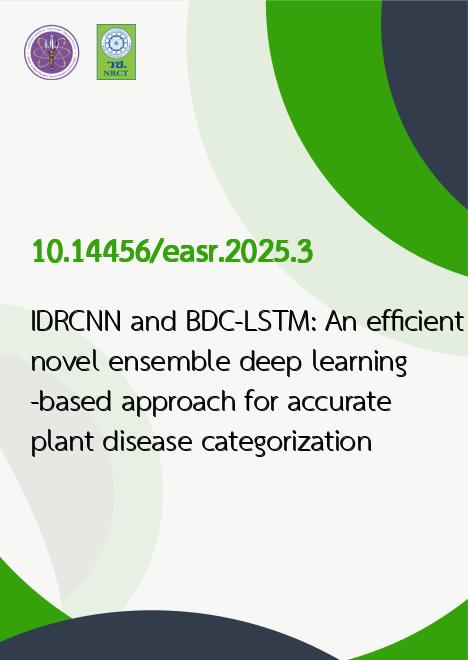
|
IDRCNN and BDC-LSTM: An efficient novel ensemble deep learning-based approach for accurate plant disease categorization |
|---|---|
| รหัสดีโอไอ | |
| Creator | 1. Shaik Salma Asiya Begum 2. Hussain Syed |
| Title | IDRCNN and BDC-LSTM: An efficient novel ensemble deep learning-based approach for accurate plant disease categorization |
| Publisher | Faculty of Engineering, Khon Kaen University |
| Publication Year | 2568 |
| Journal Title | Engineering and Applied Science Research |
| Journal Vol. | 52 |
| Journal No. | 1 |
| Page no. | 27-41 |
| Keyword | Classification, Enhanced watershed segmentation algorithm, Feature extraction, Improved deep residual convolutional neural network, Plant leaf disease, Pre-processing |
| URL Website | https://ph01.tci-thaijo.org/index.php/easr/index |
| Website title | Engineering and Applied Science Research |
| ISSN | 2539-6161 |
| Abstract | Agriculture provides food for everyone, even as the population grows. Early detection of plant illnesses in the agricultural industry is recommended to guarantee enough food for everybody. However, early crop disease detection is impossible. Nevertheless, overfitting is a common problem with these studies, and using test datasets from unfamiliar regions substantially decreases diagnostic performance. This study proposes a new Deep Learning (DL) approach for categorising illnesses affecting plant leaves. The limited number of plant leaf illness datasets can result in inadequate and overfitting generalisation of ML approaches. The use of augmentation contributes to the artificial increase in dataset variation. Remove unnecessary noise, improve the image's contrast, and eliminate the background during pre-processing. Next, the Res2Net technique extracts the appropriate attributes from the picture, including structure, colour, and texture elements. Next, hybrid deep learning (DL) approaches of the Bi-Directional Convolutional Long Short-Term Memory (BDC-LSTM) and Improved Deep Residual Convolutional Neural Network (IDRCNN) categorise plant illness into their categories. Finally, the Enhanced Watershed Segmentation Algorithm (EWSA) will extract the disease portion from the input picture. We utilised a dataset on leaf diseases for model simulation and assessment. Experimental results show that the proposed method is more accurate in classifying and identifying plant leaf disease than other approaches. The uses of the proposed DL method show their efficiency and excellent accuracy. |
